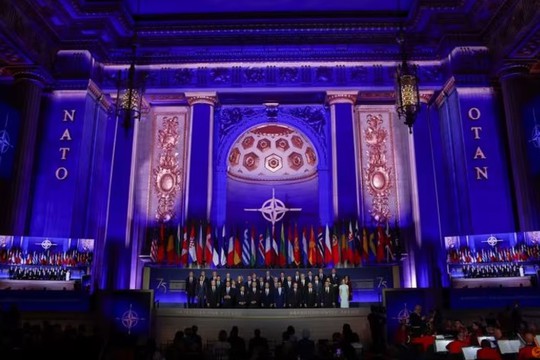Ominous view of the NATO summit in Washington
Photo: Reuters
Established during the early stages of the Cold War, NATO is now confronting a changing global landscape characterized by multipolarity, prompting discussions about its continued relevance, notes Chinese Xinhua News Agency.
NATO, which has grown from 12 members in 1949 to 32 in 2024, is a central pillar supporting the United States' extensive reach and authority in international security matters, reinforcing America's position as a dominant security power.
NATO is one of the "institutional frameworks" in the U.S. military-security apparatus that underpin the U.S. grand strategy, which aims for U.S. global hegemony, Jeffrey Sachs, a professor and director of the Center for Sustainable Development at Columbia University, told Xinhua.
The United States has been trying to strengthen NATO in three ways: expansion to Ukraine, Georgia, and even Central Asia; increased NATO engagement in East Asia; and increased weapons procurement and buildup, Sachs noted.
"The only short-term winners are the military contractors, who are making a lot of money," said the renowned economist.
Despite pledges to provide further military support for Ukraine, NATO leaders will likely refrain from making tangible progress towards its membership in the Western bloc. Some are concerned about integrating a country currently engaged in conflict with a nuclear-armed superpower.
"NATO will offer some kind of 'bridge' for Ukraine to join, but membership is unlikely until major combat operations there subside or end," William Courtney, a retired U.S. ambassador and adjunct senior fellow at the RAND Corporation, told Xinhua.
Yet, more than two years into the Ukraine-Russia conflict, peace still appears distant, serving as an example that the coalition is not promoting peace but rather threatening it.
"The United States continues to have a foreign policy that is profoundly misguided and dangerous, based on the goal of hegemony, and with the consequence of confrontation with China, Russia, and most of the developing countries. NATO is part of this misguided and dangerous foreign policy," Sachs said.
The summit is taking place as several key NATO member states are grappling with domestic political shifts at a time of political uncertainty.
A new British prime minister has just taken office, after the Conservative Party was voted out following 14 years in power. France still faces a political stalemate as no party or coalition won an absolute majority in its parliamentary elections. German Chancellor Olaf Scholz is in a weakened position following losses suffered by his party and coalition in the European Parliament elections.
In the United States, President Joe Biden is facing mounting pressure to withdraw from the 2024 presidential race due to concerns about his physical and mental fitness, after his poor performance in a presidential debate with former President Donald Trump in late June.
"Every step Biden takes, every gesture he makes, and every word he utters will be under intense scrutiny, especially in unscripted moments after the image of an aged and at times incoherent commander in chief was burned into the minds of 50 million viewers at the CNN debate in Atlanta late last month," said an analysis by CNN.
NATO is now facing a shifting global environment marked by multipolarity, prompting debates on its ongoing significance.
The situation today is markedly different from previous moments of intra-alliance tension, and the forces threatening NATO's future go beyond the personal inclinations of individual leaders, Stephen M. Walt, a professor of international relations at Harvard University, wrote in an article on Foreign Policy.
"The most obvious source of strain is the shifting distribution of world power," Walt argued, stressing that "the Soviet Union and Warsaw Pact are no more, and Russia no longer has the capacity to conquer and subdue the European continent."
Noting that most of the new endeavors after the Soviet Union broke up didn't work out that well, the professor said NATO is "in trouble" because the familiar cliches about shared values and trans-Atlantic solidarity do not resonate as powerfully as they once did, especially for younger generations.
"There are powerful structural forces gradually pulling Europe and the United States apart, and those trends will continue regardless of what happens in November, in Ukraine, or in Europe itself," he said.
read more in our Telegram-channel https://t.me/The_International_Affairs

 11:38 12.07.2024 •
11:38 12.07.2024 •























